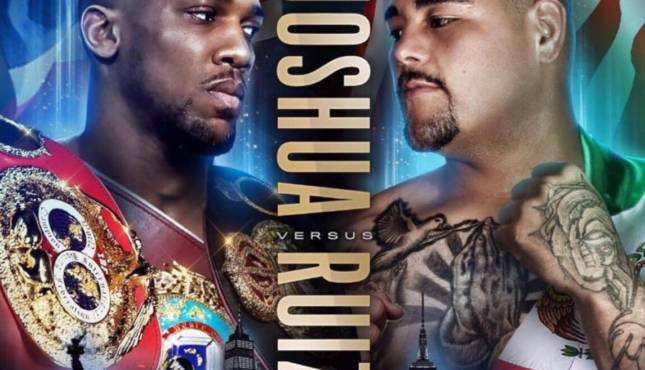mma / Columns
Ruiz’s Upset Over Joshua Tells a Familiar Tale

In combat sports, real big money fights, those that carry a seismic impact and historical weight, come along relatively infrequently. These are the fights that get everybody talking about the fight happening this weekend, and it’s a shame when other forces prevent those fights from being made.
This is, of course, a column inspired by Andy Ruiz Jr.’s historic upset knockout win to take a few boxing heavyweight titles from Anthony Joshua. Joshua had been 22-0. He’d defended his titles in grand spectacles at sold-out stadiums. He was, and still is, a megastar in the UK.
Joshua had two enormous bouts ahead of him: one against unbeaten former champion Tyson Fury, and the other against unbeaten WBC heavyweight champion Deontay Wilder. The latter bout could have determined an undisputed heavyweight champion for the first time in 20 years. Part of the appeal of each potential bout was that both fighters would be undefeated; that part of the appeal is now lost.
When fights like these don’t happen, it’s generally because the safer money is in stretching out the build to that title fight for as long as possible. Joshua could have already fought and lost to either Wilder or Fury, weakening his earnings at least until he built himself back up. By delaying those bouts, he could fight lesser opponents, beat them, and keep the gravy train rolling. That’s great, except when Andy Ruiz Jr. is there to make you look foolish.
While some will deride boxing for failing to make these fights when they should have been made and compare the sport unflatteringly to the UFC, the UFC isn’t immune to such issues.
For years, the most significant fight the UFC could make was a clash between pound-for-pound kings Georges St-Pierre and Anderson Silva. These were two supremely dominant fighters at the peak of their powers and competing in neighboring weight classes.
There were certainly logistical issues with making the match—St-Pierre was never hot on the fight, and the size difference between the two was not inconsiderable. However, the key reason the fight never happened is because both St-Pierre and Silva were strong draws independent of one another.
For years, St-Pierre was the UFC’s best live event draw and second-biggest pay-per-view draw. After a couple of years as champion, Silva became a big attraction as well, and had strong opponents like Chael Sonnen and Vitor Belfort. Simply, the UFC could have matched Silva vs. St-Pierre and done 1.1 million or so pay-per-view buys, but risked hurting the losing fighter as an attraction. Instead, they kept them as separate attractions on separate events, with St-Pierre drawing 700,000-800,000 buys for his title defenses and Silva drawing 600,000 or more for his.
The same concept applies when considering why Joshua hasn’t fought Wilder or Fury. The smarter bet was in keeping him as an independent attraction.
Something special was lost on Saturday. There would have been tremendous appeal in the undisputed heavyweight boxing championship being decided in a clash between two unbeaten fighters. It would have been a major success for whatever platform—PPV, DAZN, ESPN+, etc.—landed it. But not all is lost.
Ruiz and Joshua will fight again, probably before the end of the year if things don’t get delayed. If Joshua can get his titles back, Wilder and Fury—presuming neither loses in the interim—are still the big fights for him. Despite the loss, Joshua is still a star, and history has shown over and over again that stars can rebound from losses, especially when a big fight is on the horizon.
We only have to go back seven years to Manny Pacquiao’s disastrous 2012. In December 2008, Pacquiao destroyed Oscar De La Hoya and immediately, Pacquiao vs. Floyd Mayweather became the biggest fight in the world. There would be talks to make the fight here and there, but negotiations stalled for years. It’s the now-familiar tale of Floyd Mayweather not needing the risk of fighting Pacquiao when he was such a big star that he had no shortage of lucrative bouts in front of him.
Both Pacquiao and Mayweather kept winning, but all seemed to be lost in 2012. First, Pacquiao dropped a controversial decision to Timothy Bradley. That hurt a bit, but only very slightly—almost everyone watching agreed Pacquiao should have won. Then in December, Juan Manuel Marquez, who Pacquiao had fought to a decision three times previously, knocked Pacquiao out in the sixth round. This was no run-of-the-mill knockout; Marquez blasted Pacquiao and put him out cold.
Two-and-a-half years later, Floyd Mayweather fought Manny Pacquiao and I cannot imagine a larger combat sports event. Had Pacquiao been on an uninterrupted hot streak it certainly would have added something to the fight, but I can’t say it would have made it much bigger.
Of course, Mayweather vs. Pacquiao is a special case. Even with unbeaten records intact, Joshua vs. Wilder was only ever going to be a fraction of that fight. But it shows that losses can be overcome and the big fight can still happen. It just won’t be as special as it would have been.
Dan Plunkett has covered MMA for 411Mania since 2008. You can reach him by email at [email protected] and follow him on Twitter @Dan_Plunkett.







